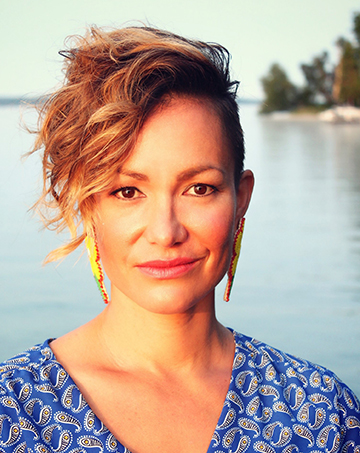Strong and resilient are two terms that barely scratch the surface when describing Olympic athlete, trauma survivor and inspiring Indigenous speaker Waneek Horn-Miller, who will be presented with a University of Lethbridge honorary degree at Spring 2022 Convocation.
A Mohawk woman from Kahnawake Mohawk Territory, Horn-Miller narrowly survived being stabbed by a Canadian soldier’s bayonet at age 14 during the Oka standoff and went on to become an Olympic athlete and respected speaker on reconciliation, sport and the importance of following one’s dreams.

“Waneek Horn-Miller embodies so much of what we teach our students here at the University,” says ULethbridge Chancellor Charles Weaselhead. “The trauma she suffered early in her life could have stopped her from pursuing her dreams but she persevered, both physically and mentally, and has continued to impact Canadian society in positive and productive ways. These graduating classes have had to endure very difficult times and have faced adversity with a dedication that will benefit them well in the future. I am very pleased to welcome Waneek to our University and thrilled she has accepted our offer of an honorary degree.”
Horn-Miller will be presented with an honorary Doctor of Laws, honoris causa, at Spring 2022 Convocation Ceremony V, Friday, June 3, 2022, at 9:30 a.m. in the 1st Choice Savings Centre for Sport and Wellness.
Waneek Horn-Miller
Waneek Horn-Miller was only 14 years old when the Oka Crisis, also called the Kanesatake Resistance, occurred in 1990. The dispute between a group of Mohawk people and the town of Oka centred on the town’s plan to extend a golf course onto land considered sacred by the Mohawk people. In protest, members of the Mohawk community erected a barricade to prevent access to the area.
After a 78-day standoff, an end to the dispute was negotiated. Horn-Miller was leading her four-year-old sister out from behind the lines when she was stabbed near the heart by a Canadian soldier’s bayonet. The incident shook her so badly she contemplated giving up her dream of becoming an Olympic athlete. Her mother reminded her she would be giving her dream away to the Canadian soldier who stabbed her if she chose that route. Horn-Miller ultimately decided to hold fast to her dream, using sports as her medication.
In 1999, she represented Canada at the Pan-Am Games and was a member of the first water polo team to win a gold medal at the games. In 2000, Horn-Miller was captain of Canada’s water polo team at the Sydney Olympics. Following her days as a competitor, she hosted APTN’s coverage of the 2010 Olympics and was the assistant chef de mission at Toronto’s Pan-Am Games in 2015.
Horn-Miller’s accomplishments have been recognized through several awards, including the Tom Longboat Award to recognize Indigenous athletes and their contributions to sport in Canada. She was named one of Canada’s most influential women in sport in 2015 by the Canadian Association for Advancement of Women and Sport. In 2019, Horn-Miller was inducted into Canada’s Sports Hall of Fame.
Following her athletic career, Horn-Miller has become a passionate advocate for the rights of Indigenous people, Indigenous education, Indigenous athletes and diversity and inclusivity in the Canadian sport system.
She also worked on the National Inquiry into Missing and Murdered Indigenous Women and Girls, as well as the Assembly of First Nations IndigenACTION initiative. An inspiring speaker, Horn-Miller frequently travels from one edge of the country to the other to talk about reconciliation, sport, overcoming adversity, and striving for a dream.
